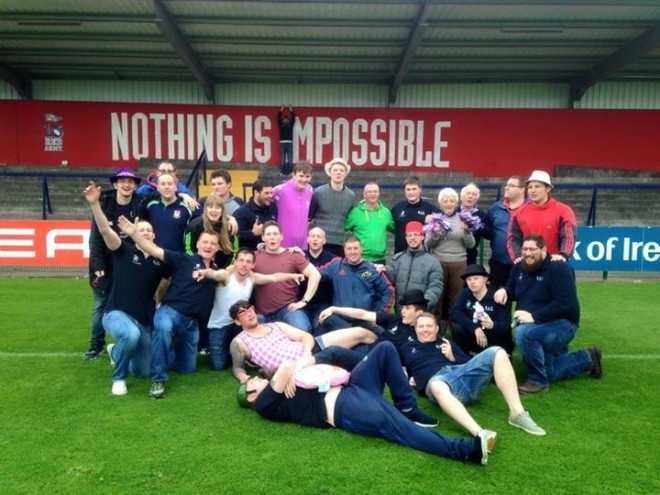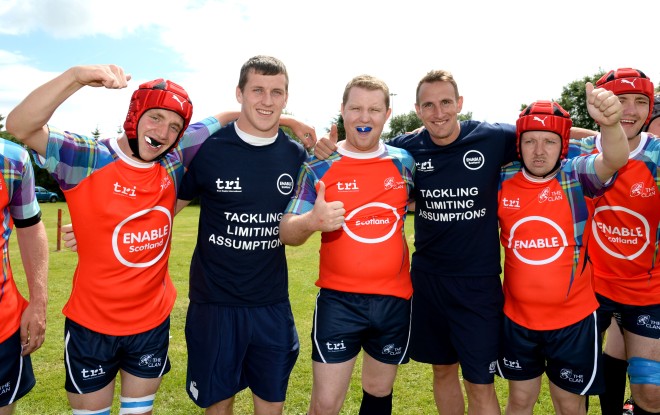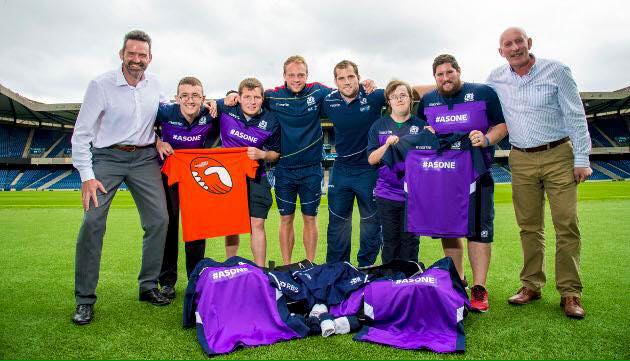Here at tri, we take great pride in every single person involved with us, be they players, coaches or supporters on the sideline. The fact that they take pride in being with us, too, is a testament to the work we all put in and we feel it is only right to share some of the impressive stories we come across every day.
Today, Collette shares her story of growth and change with us. She takes part in the Missing Trick programme by tri, Turning Point Scotland and Glasgow Caledonian University, attending rugby sessions every week before spending time in the classroom to become more involved with further education.
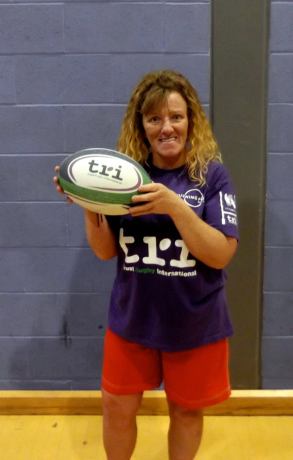
Thanks for taking the time, Collette. So, how do you feel about the rugby programme?
I absolutely love the rugby, its fantastic. To be honest it’s the highlight of my week, my entire week!
What convinced you to take part in the tri rugby programme?
I had been attending ‘Milestone’, which is a community rehab centre, back in 2014 and some of the ‘TPS Connects’ volunteers were coming into the centre to give a talk about the tri rugby programme. There were a couple of guys who had been through the community rehab before me, so they had already attended these rugby sessions and had been talking about it. I just tagged along with them one day and joined in.
How do you feel about the whole programme?
To be honest with you, I think the rugby programme is fantastic. When I first came to the sessions, I was a little nervous and anxious but everyone made me feel welcome. It’s a lot when you’re going through a community rehab programme; sometimes your confidence and self-worth are completely gone and you’re frightened to try new things. But as I say, the guys were fantastic, so welcoming and there was no judging. The whole atmosphere was brilliant, it just felt so safe and on top of that I got some physical exercise. It is amazing!
Do you think now you’re involved in this you have become more confident?
Yes definitely, doing the rugby and working with the coaches, they all make you feel in a good place and so safe. I would actually go and try new things. When I first started, I was going one week and then not but it quickly changed; what encouraged me to keep coming back was the support from the coaches and guys there.
In the summer, I had a major relapse and when I came out of hospital – I got out on the Tuesday – the first thing I wanted to do is play rugby of course I was there on the Thursday. I don’t think I’ve missed it once – in fact I have but that’s because I had to pick up my gran daughter from school one time. So looking back on the last 8 months, my whole life has changed, and that’s all down to the rugby.
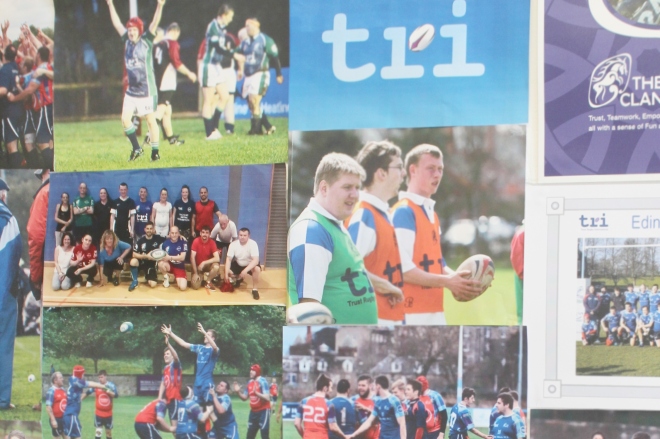
Are there ways in which you feel the programme supports your personal development or has changed you?
If I’m genuinely being honest, my whole life has changed from last summer, even my friends, family and children see it. I used to let all my stuff go and put everyone in front of me, but not now it’s all changed – if anyone says to me if I can do something on a Thursday, I say ‘My Thursdays are for rugby!’. I feel a lot better for it, I feel stronger, my family has actually grown a lot stronger, too; it’s helped me and my two children and my wee family unit. Previously it was not on a steady path, because of where I was. Now, because I’ve got so much stronger coming to the rugby throughout my recovery, my whole family has changed – it’s unbelievable. It’s had a knock on effect, even with my dad, as he trusts me now. It’s changed my whole family life: I’m a lot happier now, I’m learning new things and at the end of day I’m getting exercise.
What is the sense of community in the programme like? Have you made new friends or met old ones?
I have, it’s amazing! They’re all very supportive and obviously, playing rugby we’re a team, but it goes beyond that. I’ve made new friends, and the friendships I did have, have grown stronger. Every week, I also see other people in the programme grow, alongside myself. It’s so reassuring and with the coaches putting in their fantastic work, you don’t feel any pressure – you feel in a safe place, where you can grow. The sense of community among the group is absolutely brilliant.
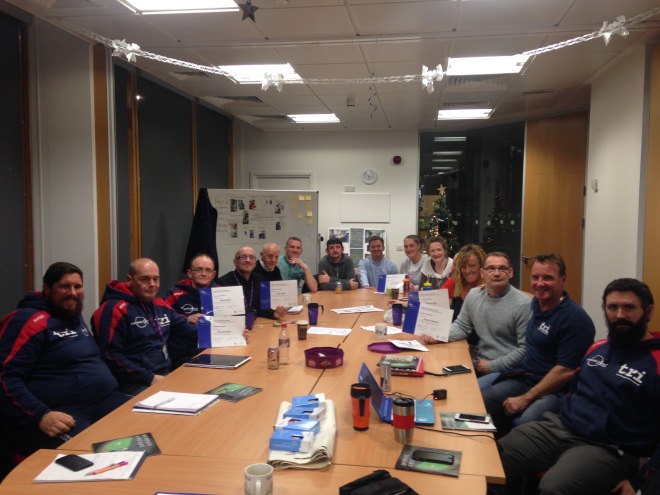
What are your hopes for the future of the programme? What do you want to achieve?
As I say, the past 9 months of my life have absolutely changed me as a person. I’ve been in recovery since 2009 but this is the first time I’ve actually experienced structure in my life. I’ve been goal setting and my health has got better. I hope to keep going to the rugby, keep encouraging more people to come – it’s a shame that a lot of people don’t know about it, so its good to get new people involved. Another personal goal for the next year or two will be to access more college courses, continue with the rugby and to be a support worker. It’s my goal and I know I will achieve it! It’s amazing, isn’t it? I know I’ve grown, I feel it myself. Last year I would never have said that about myself, which is why I want to go into support work. The thing about the rugby and the classes is that, not only are you supporting others and get stronger yourself but you have so much fun, it’s unbelievable!
Some might say it’s just one day a week but for me, that one day means I can structure my whole week and get a routine. Because later, your routine on a Thursday spills into your whole week because you’re getting more confident! At the same time, you’re constantly learning about yourself and from the coaches, so it keeps getting better. The way you guys look at things is brilliant.
Is there anything else you would have liked to talk about that I have not mentioned?
I could go on forever, I honestly feel the rugby has changed my whole life. For example, I have my uncle Frank in Canada phoning me once a every few weeks. “How’s the rugby kiddo?”, he asks – he called the other night and as he loves rugby we can talk about that now. It’s something we would never have had in common in the past. I remember, he also said to my dad, that he hears a big difference in me, just from the fact that I’ve started the programme this year. To me, that’s a lot coming from my uncle in Canada. He can’t believe the difference and now I am going to visit him in August.
This story is why it’s good that we go to other rehab services, because I know for a fact that if I hadn’t started coming to the rugby with Joe and Boaby, I don’t know where I’d be. The one thing I do know is that I wouldn’t be as happy and content in my life as I am now. I would never be where I am, never! I’ve never before felt so focused and structured in all my life, isn’t that crazy? I have also come to realise that I love learning. I never knew how much I did before I started the rugby and the class room sessions we do after the training. Now I have decided I am going to become a support worker because I love helping people. The programme has helped me make that decision, so at the moment, I’m doing a lot of volunteering and have also started a citizenship course. When I see the new guys coming in and then coming back, you see the change, especially at the early stages. It forms an extra lifeline for them.The environment the coaches create, it wouldn’t matter where the programme was held, whether it was in a park or in a wee community centre, is simply awesome.
And you want to know one of the best bits? My son tells his friends about me and the rugby. That shows that my children are getting proud of me and I’m getting some respect back. I took a lot of that away in the past but now, life is good.
